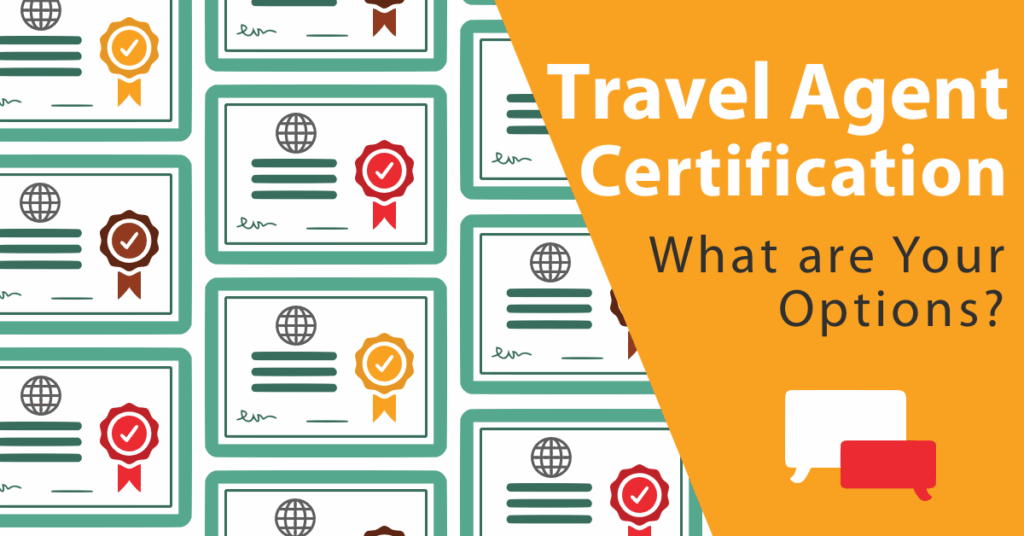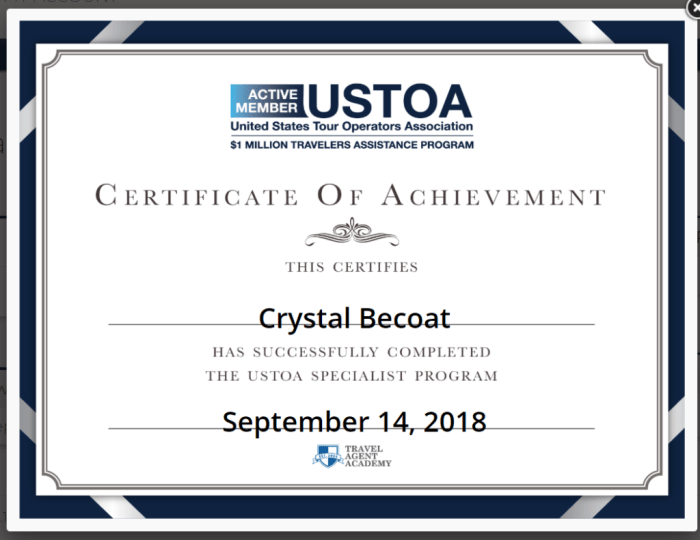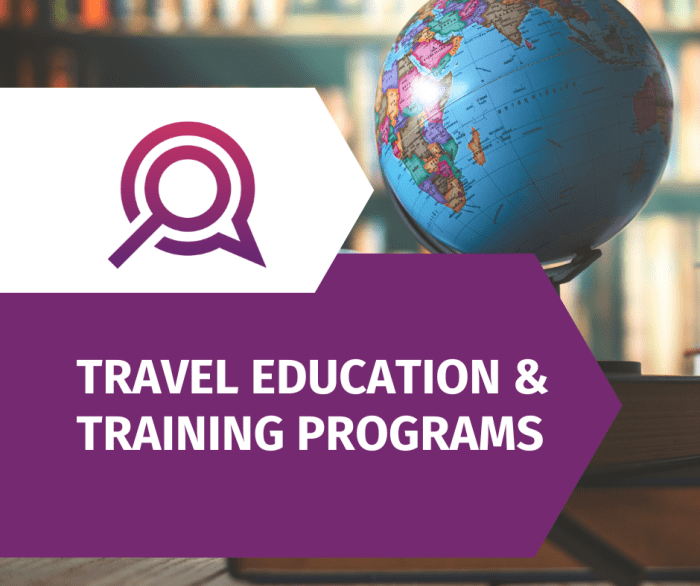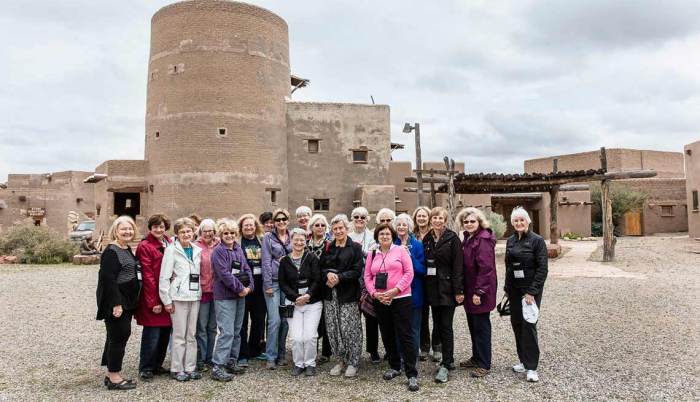Best Travel Agent Certification Programs Your Guide
The best travel agent certification programs offer a structured path to success in the dynamic travel industry. These programs equip aspiring travel agents with the essential knowledge and skills to excel in this competitive field, ranging from foundational principles to specialized niches. From understanding diverse travel styles to mastering negotiation techniques, certification programs provide a comprehensive toolkit for building a thriving career. This guide dives deep into the various certification options, comparing their curricula, costs, and potential career paths.
The diverse range of travel agent certifications caters to various career aspirations. Some programs focus on general travel agency operations, while others specialize in niche areas like luxury travel or adventure tourism. This allows aspiring agents to tailor their education to their specific interests and career goals. Understanding the different program structures, learning outcomes, and potential costs will help you make an informed decision.
Introduction to Travel Agent Certification Programs

Travel agent certification programs are increasingly important in today’s competitive travel industry. They validate a travel agent’s knowledge, skills, and commitment to professionalism, which ultimately benefits both the agent and the client. This structured learning enhances the agent’s ability to provide comprehensive and high-quality travel services.
Significance of Certification in the Travel Industry
Certification in the travel industry signifies a commitment to excellence and a dedication to providing superior service to clients. A certified travel agent demonstrates a baseline level of expertise and knowledge, potentially leading to greater trust and confidence from clients. This fosters a more professional and credible image for the agent, which can contribute to increased client referrals and business growth.
Types of Travel Agent Certifications
Numerous organizations offer travel agent certifications, each with its specific focus and requirements. Common certifications include those offered by the American Society of Travel Agents (ASTA), the Professional Travel Agents Association (PTAA), and various regional or niche-focused associations. These organizations often have specific criteria for eligibility, testing, and ongoing professional development.
Levels and Specializations within Certifications
Certifications often include different levels or specializations to cater to varying career goals and experience levels. Entry-level certifications may focus on foundational travel knowledge, while advanced certifications might delve into specialized areas like cruise planning, luxury travel, or adventure tourism. Some certifications offer specialized training for handling specific client needs, such as families, seniors, or business travelers. Furthermore, many certifications may allow for a focus on certain destinations or travel styles, catering to specific interests.
Benefits of Obtaining a Travel Agent Certification
Obtaining a travel agent certification offers several key advantages. Beyond enhancing professional credibility, it can lead to higher earning potential and increased job opportunities. Certified agents are often preferred by travel companies and clients alike. The structured curriculum of certification programs equips agents with in-depth knowledge of travel products, destinations, and regulations, ultimately leading to a more efficient and effective service delivery.
Comparison of Certification Programs
| Certification Program | Duration | Estimated Cost | Curriculum Highlights |
|---|---|---|---|
| ASTA Certified Travel Agent | Variable (e.g., self-paced online courses or in-person workshops) | $500-$1500 (including materials and potential exam fees) | Comprehensive overview of travel industry principles, including product knowledge, destination research, and customer service skills. |
| PTAA Professional Travel Agent Certification | Variable (depends on chosen path) | $700-$2000 (including materials, study guides, and exam fees) | Emphasis on practical application of travel knowledge, with a focus on building strong client relationships and efficient operations. |
| National Geographic Certified Travel Agent | Variable (self-paced online and in-person) | $1000-$2500 (including materials, exams, and potential mentorship) | Focus on sustainable and responsible travel practices, destination expertise, and adventure travel. |
Note: Costs and durations may vary depending on the specific program and chosen learning methods (e.g., self-paced online vs. in-person workshops).
Evaluating Certification Programs
Choosing the right travel agent certification program is crucial for career advancement. Different programs offer varying levels of depth and specialization, impacting the skills and knowledge gained. Careful evaluation of curriculum structure, practical skills, and learning outcomes will help aspiring agents make an informed decision.
Curriculum Structure Comparison
Various programs share fundamental travel concepts, such as destination research, booking procedures, and customer service. However, the depth and breadth of coverage differ. Some programs emphasize specific niches, like luxury travel or adventure tourism, while others adopt a more general approach. For example, the Certified Travel Counselor (CTC) designation from the American Society of Travel Agents (ASTA) might focus on a wider range of travel products and services, whereas specialized programs might delve deeper into a particular segment of the industry. Understanding these differences allows students to align their chosen program with their professional goals.
Practical Skills and Knowledge Developed, Best travel agent certification programs
Certification programs cultivate a variety of practical skills. These include proficiency in using travel industry software, negotiating rates, and resolving customer issues. Emphasis is also placed on understanding legal and ethical considerations in the travel industry. A critical skill is the ability to create comprehensive travel itineraries, reflecting an understanding of diverse client needs. Each program imparts different levels of proficiency in these key areas.
Key Learning Outcomes and Differentiation
Specific learning outcomes are crucial in distinguishing programs. Some programs might emphasize independent travel planning, while others focus on group tours or corporate travel. Different certification programs emphasize unique learning outcomes that align with distinct career aspirations. For example, a program might highlight the importance of understanding visa requirements or specialized cultural considerations for specific destinations.
Areas of Specialization
Several programs offer specializations. These can range from cruises and luxury travel to adventure tourism or international travel. The choice of specialization allows students to hone their expertise in a particular area of the travel industry. For example, a program focusing on adventure travel might incorporate modules on safety protocols and wilderness navigation.
Career Paths Associated with Certification Levels
| Certification Level | Potential Career Paths |
|---|---|
| Entry-Level Certification | Travel Consultant, Junior Travel Agent, Tour Desk Agent |
| Intermediate Certification | Lead Travel Agent, Independent Travel Planner, Cruise Specialist |
| Advanced Certification | Destination Specialist, Luxury Travel Consultant, Corporate Travel Manager |
This table illustrates the potential career paths associated with various certification levels. Note that these are general examples, and individual career progression can vary significantly depending on experience, skills, and market demand. Furthermore, additional certifications and experience often open doors to senior positions and management roles.
Program Structure and Content
Travel agent certification programs typically offer a structured curriculum designed to equip aspiring agents with the necessary skills and knowledge for success in the dynamic travel industry. These programs cover a wide range of topics, from fundamental travel concepts to advanced planning techniques, and emphasize practical application through real-world scenarios and hands-on exercises. Understanding the program structure and content is crucial for prospective students to determine if the program aligns with their career goals and learning style.
Course Modules
A comprehensive travel agent certification program typically includes a series of modules, each focusing on a specific aspect of the travel industry. These modules are carefully designed to build upon each other, ensuring a gradual and thorough understanding of the subject matter. Modules usually cover the entire spectrum of travel planning, from initial client consultation to final travel arrangements.
Required Skills and Knowledge
Each module in a certification program demands specific skills and knowledge. For instance, the initial modules often focus on foundational concepts such as geography, different travel types (leisure, business, etc.), and basic travel regulations. As the program progresses, modules delve into more complex areas like itinerary design, accommodation selection, and transportation arrangements. Proficiency in customer service, communication, and problem-solving is also emphasized throughout the program. Strong research skills are also crucial for effectively gathering and evaluating information for client needs.
Teaching Methodologies
Effective teaching methodologies are essential for imparting practical skills. Interactive workshops, role-playing exercises, and case studies are common techniques used to develop critical thinking and problem-solving abilities. These methods allow students to practice their skills in simulated travel scenarios, fostering a practical understanding of the industry’s nuances. Experienced travel agents and industry professionals are often brought in as guest speakers to provide real-world insights and perspectives. Online learning platforms and digital resources may also be utilized for supplementing classroom instruction. Hands-on experience, often in the form of group projects or internships, further develops practical skills.
Real-World Scenarios
The curriculum incorporates real-world scenarios to prepare students for the complexities of the travel industry. These scenarios might involve dealing with challenging client requests, managing unexpected disruptions (like flight cancellations), or navigating complex travel regulations. Students learn to anticipate potential issues and develop effective strategies to mitigate risks and deliver exceptional service. The program may involve simulations of booking and handling issues that are similar to the actual day-to-day operations of a travel agency.
Module Breakdown
| Module | Key Topics | Practical Exercises |
|---|---|---|
| Introduction to Travel | Fundamentals of travel, types of travel, travel regulations, and basic geography. | Researching destinations, identifying client needs, and creating initial itineraries. |
| Destination Research and Planning | Detailed analysis of destinations, cultural considerations, and visa requirements. | Creating detailed destination briefs, identifying appropriate accommodations, and researching transportation options. |
| Accommodation and Transportation | Types of accommodations, booking procedures, and transportation options. | Comparing prices, booking accommodations and transportation, and developing transportation strategies for clients. |
| Booking and Ticketing | Booking procedures, ticketing, and handling confirmations. | Booking multiple elements of a trip, creating client itineraries, and managing bookings in a simulated agency environment. |
| Customer Service and Communication | Effective communication, conflict resolution, and customer relationship management. | Handling client inquiries, resolving issues, and maintaining positive relationships. |
| Travel Insurance and Policies | Understanding various travel insurance options and policies, and explaining policies to clients. | Assessing client needs for insurance, presenting different options, and managing claims. |
| Travel Agencies and Regulations | Travel agency operations, legal and regulatory frameworks, and ethics in travel. | Managing client data, understanding compliance issues, and making ethical decisions in the travel industry. |
Certification Providers and Recognition

Source: chbworldtravel.com
Choosing the right travel agent certification program is crucial for career advancement and industry recognition. Reputable providers often offer comprehensive training, industry-recognized credentials, and ongoing support, which are key elements for success in the dynamic travel industry. Understanding the different providers and their levels of recognition within the industry is vital for making an informed decision.
Reputation and Credibility of Certification Providers
Different certification providers hold varying levels of prestige and recognition within the travel industry. Established organizations with a strong track record of providing quality education and training tend to command greater respect. Consider the history and experience of the provider, as well as any affiliations with industry associations or organizations. A provider’s reputation is often reflected in the qualifications of its instructors, the curriculum’s relevance to current industry practices, and the overall value proposition of the certification.
Industry Recognition and Acceptance of Certifications
Industry recognition and acceptance of certifications vary. Some certifications are widely recognized and respected by travel companies and organizations, while others may hold less weight. This recognition often depends on factors such as the provider’s reputation, the comprehensiveness of the curriculum, and the demand for certified professionals. Travel agents with certifications that are well-regarded in the industry may have better opportunities for career advancement, increased earning potential, and more job prospects.
Accreditation Bodies Overseeing Certification Processes
Several organizations act as accreditation bodies, ensuring the quality and standards of certification programs. These bodies establish guidelines and criteria for certification providers, ensuring a consistent level of quality and rigor in the training offered. Recognition by a reputable accreditation body often strengthens the credibility and value of a certification. Examples include organizations focused on professional development and education within the travel and tourism sector.
Importance of Choosing a Reputable Provider
Selecting a reputable certification provider is essential for maximizing the return on investment and career benefits. A reputable provider typically offers a comprehensive curriculum, experienced instructors, and strong industry connections. This can lead to better career opportunities, enhanced job prospects, and greater earning potential. A program’s ability to adapt to evolving industry trends and technological advancements is also a significant factor in selecting a reputable provider.
Certification Provider Comparison Table
| Certification Provider | Accreditation Body | Program Details (e.g., Duration, Modules) |
|---|---|---|
| ABC Travel Academy | International Association of Travel Agents (IATA) | 200-hour program, covering core travel agent skills, destination knowledge, and customer service. |
| Global Travel Institute | National Association of Travel Professionals (NATP) | 150-hour program focusing on specialized travel niches, such as cruises and luxury travel. |
| XYZ Travel Solutions | No Accreditation | 100-hour program, emphasizing technology and online travel agencies. |
| Travel Pro Certification | Professional Travel Management Association (PTMA) | 120-hour program, encompassing a wide range of travel product knowledge and practical skills. |
Cost and Duration of Programs
The cost of travel agent certification programs varies significantly depending on the program’s structure, provider, and specific features. Understanding these factors is crucial for prospective students to make informed decisions, aligning their budget with their educational goals. Program duration also plays a key role, influencing the time commitment and overall investment required.
Financial aid and scholarship opportunities are available for eligible students, easing the financial burden of pursuing a certification. Duration, whether online or in-person, significantly impacts the time needed to complete the program. The cost-benefit analysis of different programs considers the program’s value proposition against its associated financial investment.
Typical Program Costs

Certification programs typically involve a tuition fee, potentially including materials, access to online resources, and exam fees. Costs can range from a few hundred dollars to several thousand, with factors like the program’s intensity, duration, and the provider influencing the overall expense. For example, comprehensive programs offered by recognized organizations often command higher fees compared to shorter, introductory courses.
Financial Aid and Scholarships
Numerous organizations offer financial aid and scholarships to assist students in pursuing travel agent certification. These opportunities are often available through educational institutions, industry associations, and even specific program providers. For instance, some organizations may provide need-based or merit-based scholarships to students demonstrating exceptional academic performance or a commitment to the travel industry. Many travel agencies may also provide tuition assistance to employees pursuing certifications.
Program Duration
The duration of certification programs varies considerably. Online programs often offer greater flexibility, allowing students to complete the course at their own pace. In contrast, in-person programs typically require a fixed schedule, providing structured learning experiences and often facilitating networking opportunities. The duration of the program is directly proportional to the program’s comprehensiveness.
Comparison of Cost-Benefit Analysis
A comprehensive cost-benefit analysis involves evaluating the total program cost against potential future earnings and career advancement opportunities. Factors such as salary increases, improved job prospects, and the potential for increased clientele should be considered. For example, a longer, more comprehensive program might lead to a higher earning potential, but it may also necessitate a greater initial financial investment. The cost-benefit analysis is highly personal and depends on individual circumstances and career aspirations.
Program Cost, Duration, and Funding Options
| Program Provider | Program Cost (USD) | Program Duration (Months) | Funding Options |
|---|---|---|---|
| ABC Travel Academy | $1,500 – $3,000 | 3-6 | Need-based scholarships, student loans, and agency tuition assistance |
| XYZ Certification Institute | $2,000 – $5,000 | 6-12 | Merit-based scholarships, industry grants, and employer tuition reimbursement |
| Global Travel Management | $2,500 – $6,000 | 4-8 | Financial aid packages, external grants, and online funding options |
Key Considerations for Choosing a Program

Source: fyndtravel.com
Selecting the right travel agent certification program is crucial for career advancement. A well-structured program equips individuals with the knowledge and skills needed to thrive in the competitive travel industry. Careful consideration of various factors, including accreditation, faculty expertise, and curriculum alignment, is essential in making an informed decision.
Program Accreditation and Recognition
Accreditation and recognition from reputable organizations are vital indicators of a program’s quality. These external validations ensure the program meets established standards, providing graduates with credentials recognized by industry professionals and employers. Programs accredited by recognized bodies, like the National Commission for Certifying Agencies (NCCA), are more likely to provide a comprehensive and rigorous learning experience. This recognition often translates to increased credibility and job opportunities for graduates. For example, a program accredited by the NCCA enhances the credibility of its graduates in the eyes of prospective employers.
Faculty Expertise and Industry Experience
The qualifications and experience of the faculty play a significant role in the learning experience. Faculty with extensive industry experience provide invaluable insights and practical knowledge, enriching the curriculum and offering students real-world perspectives. Look for faculty who have held leadership roles in the travel industry or are actively involved in professional organizations. Faculty with diverse experience and backgrounds in different aspects of travel (e.g., hotels, airlines, cruises) provide a well-rounded understanding of the field. This kind of expertise often leads to more practical and engaging learning opportunities.
Curriculum Relevance and Industry Alignment
The curriculum’s relevance to current industry trends and needs is critical. A program should be dynamic and adaptable to changes in the travel sector, including advancements in technology, evolving consumer preferences, and emerging travel destinations. A curriculum should cover essential topics like booking procedures, destination knowledge, and customer service skills. A well-structured curriculum aligns with the latest industry practices, ensuring graduates possess the knowledge and skills demanded by employers. For example, a program should include modules on sustainable tourism and digital marketing, reflecting the increasing importance of these topics in the industry.
Learning Resources and Support Services
Adequate learning resources and support services enhance the overall learning experience. Assess the program’s online learning platform, library resources, and access to industry professionals. Consider whether the program provides mentorship opportunities, networking events, or career counseling services. Comprehensive support systems offer graduates a competitive edge by providing ongoing guidance and resources after graduation. A program offering career guidance and networking opportunities empowers students with the tools to launch successful careers.
Crucial Factors to Consider When Selecting a Program
- Accreditation: Verify the program’s accreditation status with recognized organizations. Look for programs accredited by relevant bodies, like the NCCA.
- Faculty Expertise: Research the qualifications and industry experience of the faculty. Prioritize faculty with extensive experience and practical knowledge.
- Curriculum Relevance: Evaluate the curriculum’s alignment with current industry trends and needs. Ensure the program incorporates essential topics and practical applications.
- Learning Resources: Assess the quality and availability of learning resources, including online platforms, libraries, and industry connections.
- Support Services: Evaluate the program’s career support services, such as mentorship opportunities, networking events, and career counseling.
- Program Cost and Duration: Consider the program’s tuition fees and the timeframe for completion.
- Reputation and Success of Graduates: Investigate the program’s reputation and the success stories of its graduates in the industry.
Tips and Tricks for Success

Completing a travel agent certification program requires a strategic approach. Beyond simply studying the material, effective time management, focused learning techniques, and networking within the industry are crucial for a smooth and rewarding journey. These strategies will not only help you succeed in the program but also prepare you for a fulfilling career in the travel industry.
Study Strategies and Techniques
Effective study habits are vital for absorbing the extensive information covered in certification programs. A consistent study schedule, incorporating varied learning methods, and utilizing effective note-taking strategies, are key components. Spaced repetition, where you revisit material at increasing intervals, strengthens retention. Using flashcards, mind maps, or practice quizzes can further reinforce your understanding. Consider joining study groups with fellow students, as collaborative learning can be exceptionally helpful in identifying areas needing further clarification.
Balancing Studies with Other Commitments
Juggling studies with work, family, or other commitments requires careful planning and prioritization. Create a detailed schedule that allocates specific time slots for studying. Prioritize tasks, break down large study sessions into smaller, manageable chunks, and utilize any available study breaks. Seek support from family and friends if needed. Finding a balance is essential, ensuring you can effectively dedicate time to learning without neglecting other important aspects of your life.
Networking with Industry Professionals
Networking with travel industry professionals can significantly enhance your learning experience and future career prospects. Attend industry events, webinars, or workshops to connect with professionals in the field. Reach out to travel agents or agencies for informational interviews. Engage with industry forums or online communities. Remember to actively listen and learn from experienced professionals. Building a strong network of contacts will open doors to invaluable guidance and opportunities.
Key Takeaways for Effective Learning
“Consistency, focused learning, and networking are the cornerstones of success in any travel agent certification program.”
- Develop a structured study schedule that accommodates your commitments.
- Employ varied learning techniques like flashcards, mind maps, and practice quizzes.
- Prioritize tasks, break down large study sessions, and utilize breaks effectively.
- Network with industry professionals by attending events and seeking informational interviews.
Conclusion: Best Travel Agent Certification Programs
In conclusion, pursuing a travel agent certification is a strategic investment in your future career. By comparing programs, understanding the curriculum, and considering cost and duration, you can identify the best fit for your goals. This comprehensive guide provides a solid foundation for navigating the world of travel agent certifications and choosing the path that best aligns with your aspirations. The wealth of information presented should equip you to make a well-informed decision about your career trajectory.





